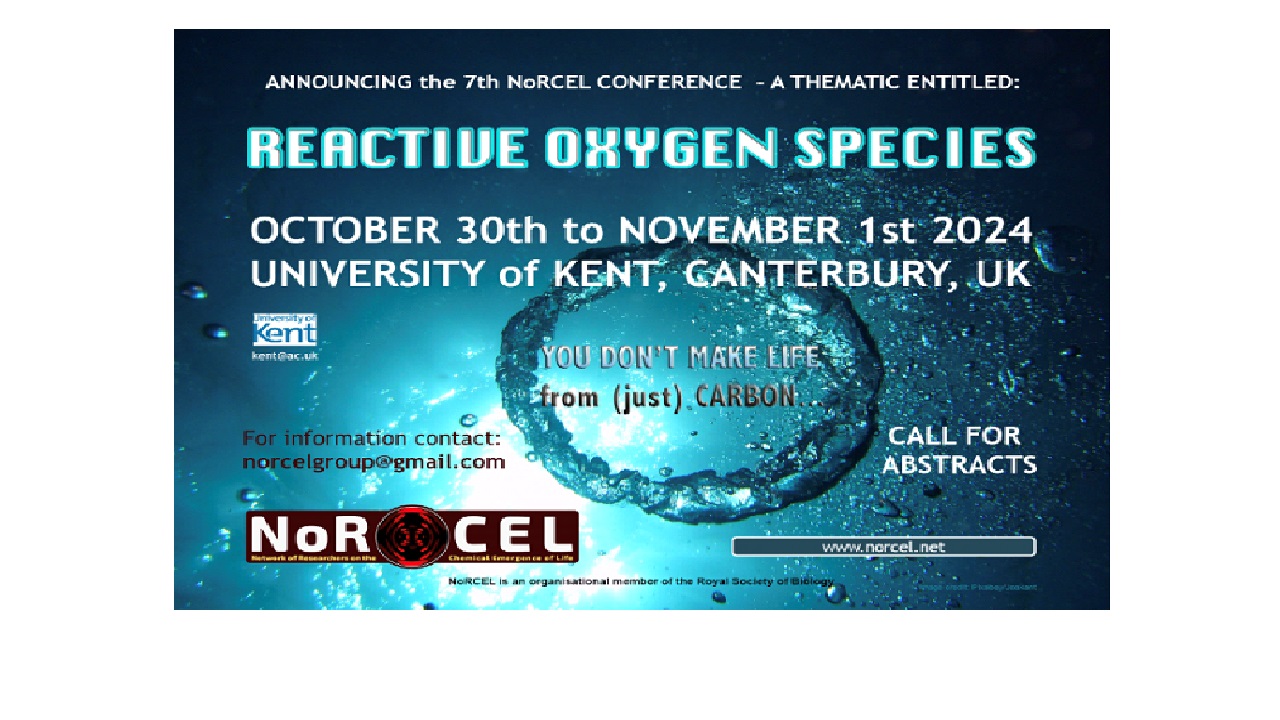
Thematic Conference by NoRCEL: “Reactive Oxygen Species”
This year, the spotlight is on reactive oxygen species (ROS) and topics of related relevance. Besides the O2 molecule itself, ROS are understood to include the hydroxyl radical, oxygen radicals and ions, ozone, the oxygen molecule in the triplet state, the oxygen atom, hydrogen peroxide and other peroxy species, and nitric oxide. In recent years, research on ROS across several disciplines has advanced rapidly, producing significant new results on their generation, interactions, and decay on rocky and icy planetary and other astronomical bodies, in pre-biotic chemistry and the emergence of life, and their relationships with biology including (contentiously) primitive anaerobic life. It is timely to draw these advances together as a big-picture, cross-disciplinary ‘summit’ theme, with the aim of synthesizing current knowledge, surveying related open questions, and planning future interdisciplinary researches on the complicated roles played by these energetic – and enigmatic – species in our dynamic solar system.
Early Career Workshop: Microsatellites and their use in planetary and astrobiology research
(Tartu, Estonia, 24-31 August 2024)
The aim of the workshop will be to enable students and early career scientists to design micro-and nanosatellite missions tackling scientific themes and target objects they have chosen themselves previously. The workshop will consist of three parts:
In order to plan missions involving such small satellites successfully, intensive interaction and cooperation between scientists and space technologists are necessary, which is still lacking in some potential key applications.The workshop school aims to:
The work on the mission designs will continue after the workshop, thus ensuring a long-term impact.
The European Astrobiology Institute, Univeristy of Tartu and Stockholm University Astrobiology Centre will function as co-organisers of the workshop.
The workshop will consist of lectures by leading scientists, planning of for different micro- or nanosatellite projects in small groups as well as open discussions. Participants will also have the possibility to display their own research results in a poster session. Furthermore, a one-day excursion to South-Estonia and a walk around Tartu is included as a social programme.
The event is open to applicants from all nationalities. Nevertheless, recommendation letters for visa applications are only issued for participants selected by the organisers.
PLEASE NOTE: A limited number of bursaries for students and early career scientists (up to 8 years from their first Ph. D. in a related field) from EAI institutions (see a list here) will be available. We are also working to get some funding for students and early career scientist from the US. Participants from EAI Institutions selected by the EAI for bursaries will be offered free lunches, excursions, farewell dinner and accommodation in a shared 2-bedded room for at Raatuse Hostel from 23 August (arrival) to 1 September 2024 (departure), but have to fund their travel on their own. There is no special application for the bursaries, just send in your application form and tell us in the e-mail. Participants selected for the bursaries will be notified immediately after the application deadline (in good time after the registration deadline).
Application deadline is 1st May 2024.
All information is found on the on the website: https://sisu.ut.ee/microsatellites2023